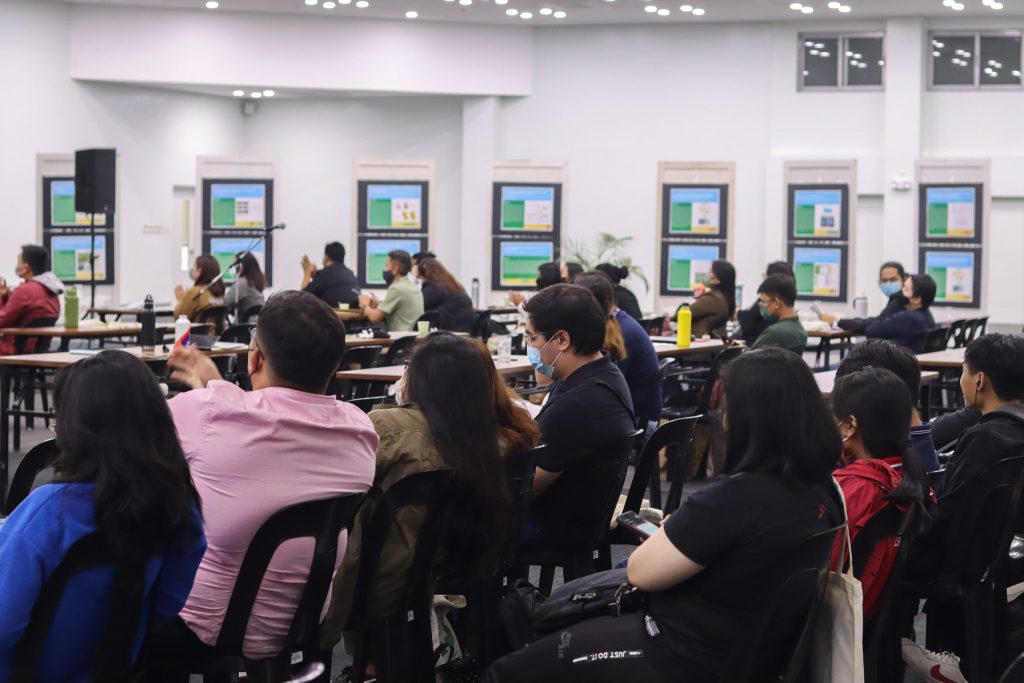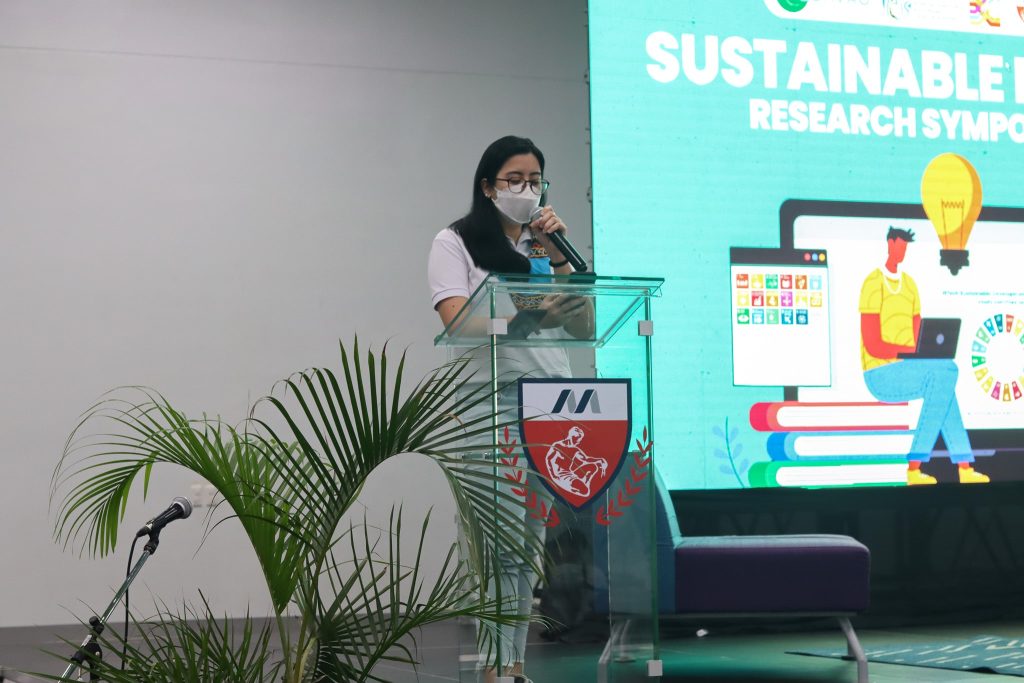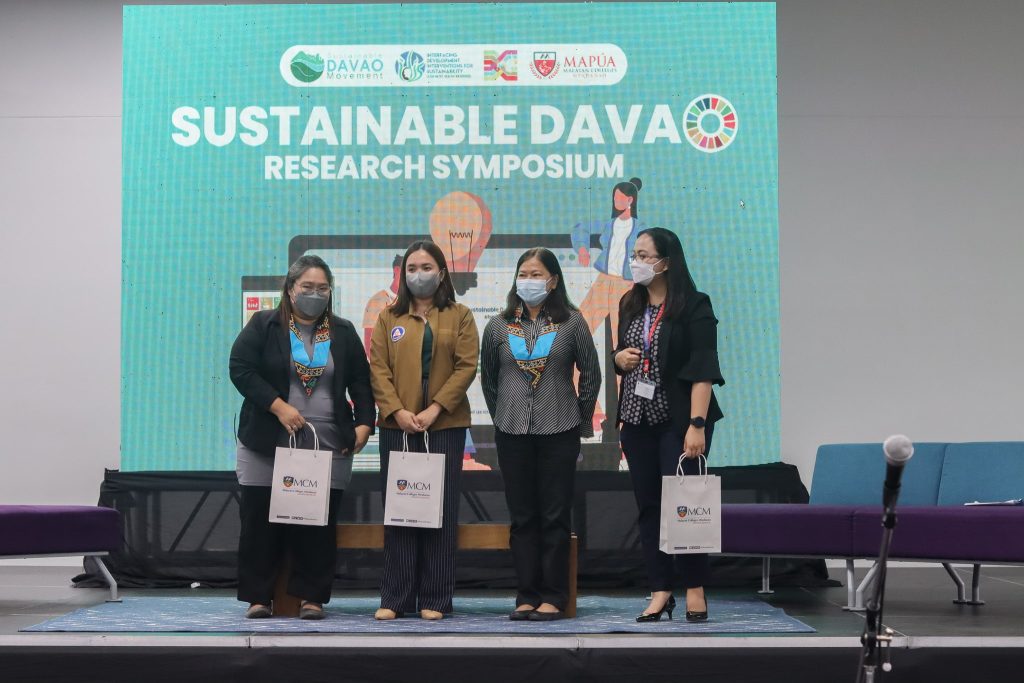Dr. Gernelyn Logrosa, Head of Mapúa MCM’s Office for Research, Development, and Innovation (ORDI) together with esteemed guests at the Sustainable Davao Research Symposium.
Mapúa Malayan Colleges Mindanao hosted this year’s Sustainable Davao Research Symposium, with the theme “Enhancing Sustainability and Climate Action for Davao Region through Sustainable Development Goals (SDG) -Oriented Studies” last November 11, 2022. The symposium was organized by the Sustainable Davao Movement (SDM) in collaboration with Mapúa Malayan Colleges Mindanao, Mindanao Times, and the Mindanao Development Authority.
The United Nations’ 17 Sustainable Development Goals (SDGs) are a call for action in combating poverty and other forms of impoverishment. It emphasizes the need for policies that enhance health and education, alleviates inequality, promotes economic growth, mitigates climate change, and take action to protect our oceans and forests.
“As a learning institution, it is our main responsibility to equip our students with the knowledge, skills, attitudes, and values that they need to make wise and responsible decisions for a sustainable future, for themselves, the environment, and society as a whole.” Alejandro H. Ballado Jr, the Executive Vice President / Chief Operating Officer of Mapúa MCM said in the welcoming remarks.
He noted that this is the second time MMCM has partnered with the SDM towards the realization of Davao City’s Sustainable Development Goals. He also added that it is a great honor to work with SDM for this important cause, with environmentalists from the public and private sectors, as well as with our peers from higher education institutions.

The organizers also included other areas within the Davao Region in order to broaden the focus of development and firmly establish sustainable development goals. This symposium seeks to enhance sustainable living practices by promoting the implementation of the Sustainable Development Goals in the Davao Region and South-Central Mindanao.
For this year’s symposium, Interfacing Development Interventions for Sustainability (IDIS) shared that unlike the SDG Symposium conducted in 2018, there is no competition amongst the presenters. Hence, it was a plain presentation to showcase all the studies that are SDG-oriented.
“SDG-driven research is vital in Davao Region’s progressive advancement. We are glad to share and contribute such recommendations through this symposium with the intent of supporting our leaders in governance in making well-informed decisions.” Dr. Gernelyn Logrosa, Head of the Office for Research, Development, and Innovation of Mapúa MCM, said.
Among the presenters were representatives from Mapúa Malayan Colleges Mindanao, Ateneo de Davao University, University of the Philippines – Mindanao, University of the Philippines, and Davao Medical School Foundation.
The submissions were reacted to by an excellent panel of reactors as well as representatives from the Office of the Civil Defense XI, Department of Human Settlements and Development XI, Department of Environment and Natural Resources XI, Mindanao Development Authority, and Mapúa Malayan Colleges Mindana
The following papers were presented during the morning session of the symposium for the following categories: Biodiversity & Wildlife, Waste Management, Water Management, Health & Sanitation:
- “Can butterflies cope with city life? Butterflies in Urban Green Spaces of Davao City, Philippines” by Harvey Salaga
- “Species Composition of Volant and Small Non-Volant Mammals in the Green Spaces of Davao City, Davao del Sur, Philippines” by Brian Pototan et al
- “Opportunities for Enhancing Epidemic Preparedness through Wastewater-Based Epidemiology in Highly-Urbanized Cities” by Maria Otero
- “Optimal Process Network for Integrated Solid Waste Management in Davao City, Philippines” by Kristin Olalo
- “Improper Disposal of COVID-19 Associated Waste in Davao City: A Concern to Health and Environment” by John Paul Banzon
- “Risk Factors Associated with Severity and Survivability of Covid-19 patients: Empirical Evidence from Davao Region” by Charisse Miguel et al
- “Vulnerability Assessment of Emerging Infectious Diseases (EID) in Davao City, Southern Philippines” by Marie Damgo et al

In the afternoon session, the symposium continued with papers under the categories of Education, Disaster Risk Management, Urban Planning, Infrastructure Development, and Economic Growth:
- “The Mediating Effect of Synchronous E-learning on the Relationship Between Digital Literacy and Writing Skills of English-Major College Students: A Mixed Method Study” by Dr. Febs Ramos
- “The Influence Of Level Of Sustainability Reporting On The Financial Performance Of Publicly Listed Companies In The Philippines With Firm Size As Moderating Variable” by Muhammad Lucman, et al
- “Synthesis of Nanocellulose from Durian Rinds for the Preparation of a Self-healing Smart Concrete with Augmented Mechanical Properties” by Ivanbert Damasco
- “Statistical Approach in the Determination of Causality Factors of Seismic Capacity of Reinforced Concrete Residential Buildings” by John Liu et al
- “KALINAW – A Proposed Forest Education Center and Stormwater Park: A Study on Utilizing Flood Retention Zones as Spaces for Ecological Literacy” by Christian Sangadi, et al
- “Stakeholders Valuation on Davao City Parks: A Study on Determining Public Value” by Angelo Regalado
- “Is the government’s socialized housing program serving the needs of low-income households? The case of Davao City” by Micah Yares
- “Characterizing the Urban Green Spaces in Davao City, Philippines: Implications for Design and Management” by Ryan Songcayauon
- “Land Use Change of Urban Wetlands in Davao City”by Lemuel Manalo
The event was also graced by the presence of representatives from various government agencies, especially the Office of the Vice Mayor and Office of Councilor Acosta, the City Agriculturist Office, the City Tourism Office, and the Philippine Science High School Faculty.
The event was deemed a success as the papers exceeded the expected number of submissions. The symposium opened various opportunities not just for the proponents, but also for the development of Davao City.
Ms. Jhoana Alilin, the Partnership Building Officer of IDIS, shared her key takeaway from the symposium, “If you have discovered something that could benefit the progress of our city, share it. That might be the answer to our dilemma. I am overwhelmed with the support given to us by our partnered institutions in making this event a success. I hope that at the next SDG Symposium, we could target to have diverse studies from the Davao Region.” Ms. Alilin also remarked.


